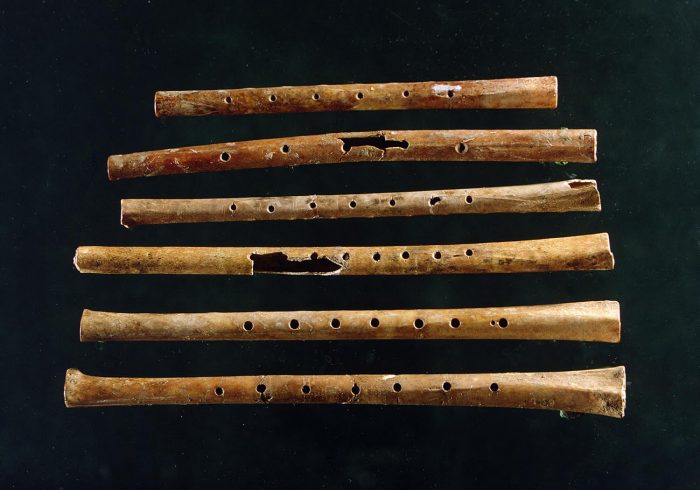
Classical music enthusiasts seem to agree that the renewal of interest in period instruments made for a noticeable change in the sound of most, if not all, orchestral performances. But doesn’t the replication and use of viols, ophicleides, and fortepianos from the times of Bach, Beethoven, and Mozart raise a curiosity about what people used to make music generations before them, and generations before that? How early can we get into early music and still find tools to use in the 21st century? Since the end of the 20th, we’ve had the same answer: about nine millennia.
“Chinese archeologists have unearthed what is believed to be the oldest known playable musical instrument,” wrote Henry Fountain in a 1999 New York Times article on the discovery of “a seven-holed flute fashioned 9,000 years ago from the hollow wing bone of a large bird.”
Those holes “produced a rough scale covering a modern octave, beginning close to the second A above middle C,” and the fact of this “carefully selected tone scale indicates that the Neolithic musicians may have been able to play more than single notes, but actual music.”
You can hear the haunting sounds of this oldest playable musical instrument known to man in the clip above. When would those prehistoric humans have heard it themselves? Fountain quotes ethnomusicologist Frederick Lau as saying that these flutes “almost certainly were used in rituals,” perhaps “at temple fairs, burials and other ritualistic events,” and possibly even for “for personal entertainment.” 9,000 years ago, one surely took one’s entertainment where one could find it.
If this listening experience has given you a taste for the real oldies — not just the AM-radio but the history-of-mankind sense — you can also hear in our archive the 43,000-year-old “Neanderthal flute” (found only in fragments, but reconstructed) as well as such ancient songs as 100 BC’s “Seikilos Epitaph,” a composition by Euripides from a century before that, and a 3,400-year-old Sumerian hymn known as the oldest song in the world, all of which raises an important question: what will the people of the year 11000 think when they unearth our DJ rigs, those artifacts of so many of our own ritualistic events, and give them a spin?
You can get more information on this ancient flute here.
Related Content:
What Ancient Greek Music Sounded Like: Hear a Reconstruction That is ‘100% Accurate’
Listen to the Oldest Song in the World: A Sumerian Hymn Written 3,400 Years Ago
Hear the World’s Oldest Instrument, the “Neanderthal Flute,” Dating Back Over 43,000 Years
Based in Seoul, Colin Marshall writes and broadcasts on cities and culture. He’s at work on a book about Los Angeles, A Los Angeles Primer, the video series The City in Cinema, the crowdfunded journalism project Where Is the City of the Future?, and the Los Angeles Review of Books’ Korea Blog. Follow him on Twitter at @colinmarshall or on Facebook.


I would líke to receive That oldest flute músic.
Is ver y beautiful músic.
Very interesting.
Thought it was important to note, that, while this may be the oldest known PLAYABLE instrument, it is far from the oldest instrument ever discovered.
This article from BBC.com, written May 25th, 2012, describes instruments found in cave in southern Germany which have carbon dated to be about 42,000–43,000 years old.
Source: http://www.bbc.com/news/science-environment-18196349
Another article, describes what was previously thought to be the oldest known instrument, found nearby in a southwestern German cave and dated to 39,000 years old.
Source: http://news.bbc.co.uk/2/hi/science/nature/8117915.stm
‘and possibly even for for personal entertainment.’
“Possibly even…”??? Seriously? You have never lived in small rural communities? Think of how the fiddle, bohdran, harp and flute are used just in Ireland… AT THE PUB!! Or for that matter the drawing room pianoforte, where people would entertain one another with music and song of an ordinary social evening.
Humans are social animals ans we require social gatherings where, using culture, we bond in friendship, heal rifts and find friends and lovers.
How many “rituals” and “burials” did you attend this month? Compare this to
How many social engagements that included “personal entertainment”?
Tomorrow I go to a routine rural off-grid social gathering of my “tribe” where there will be shared food and a small open mic after dinner to entertain each other . Why would this have been any different for humans 45,000 years ago?